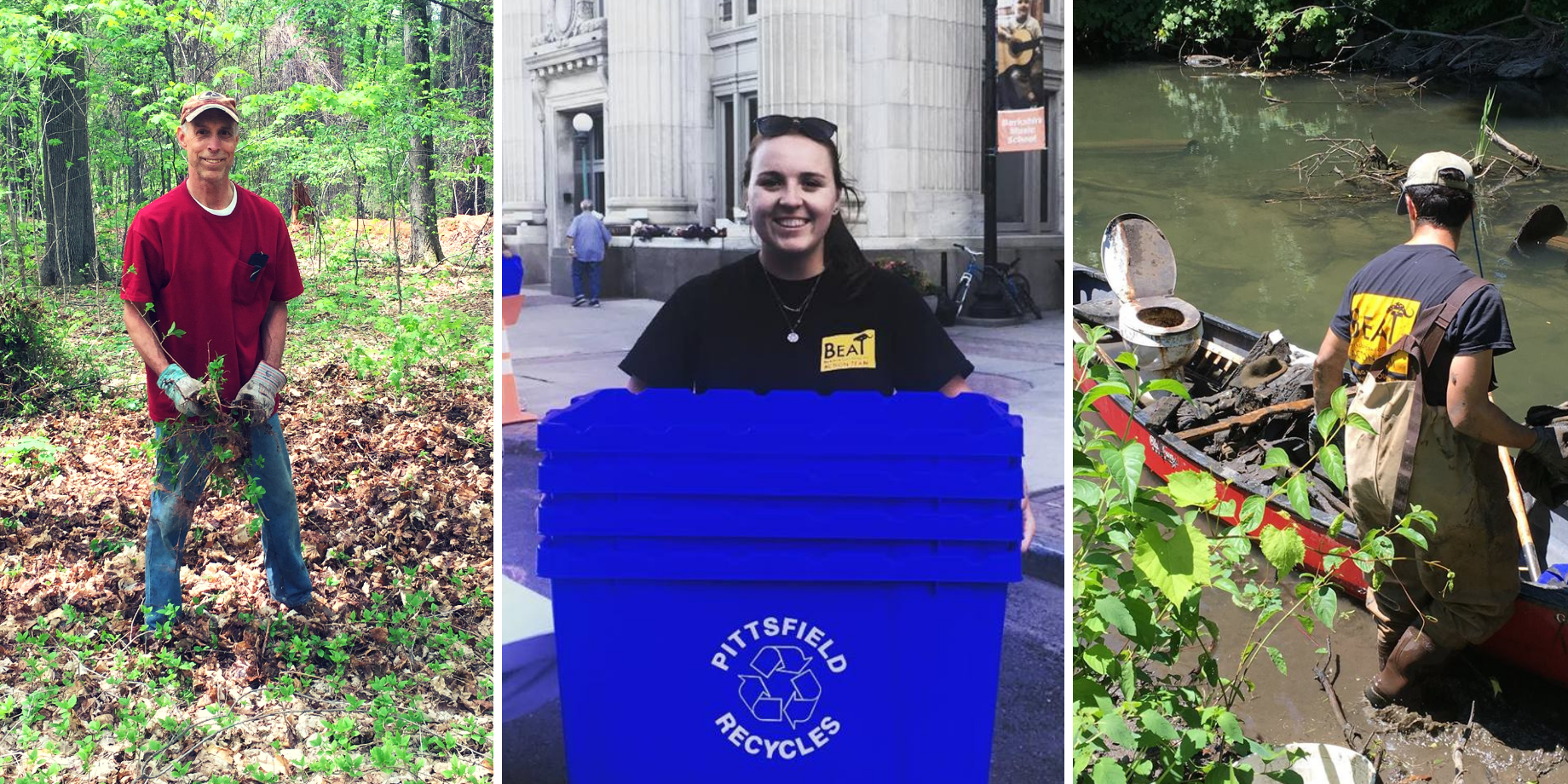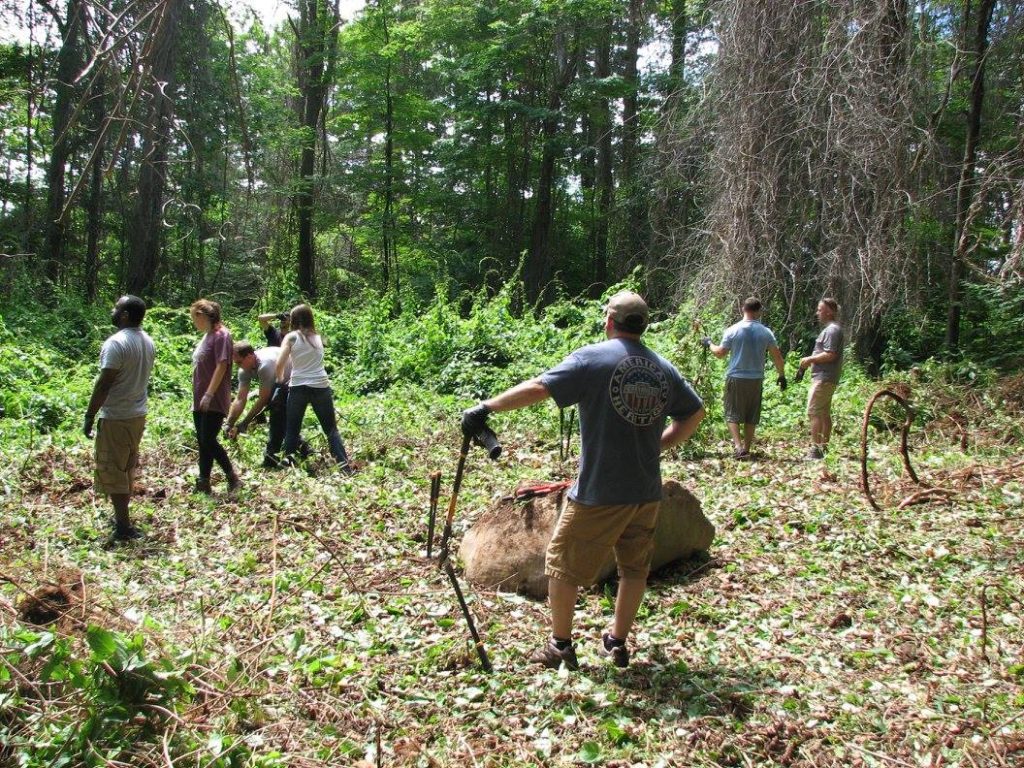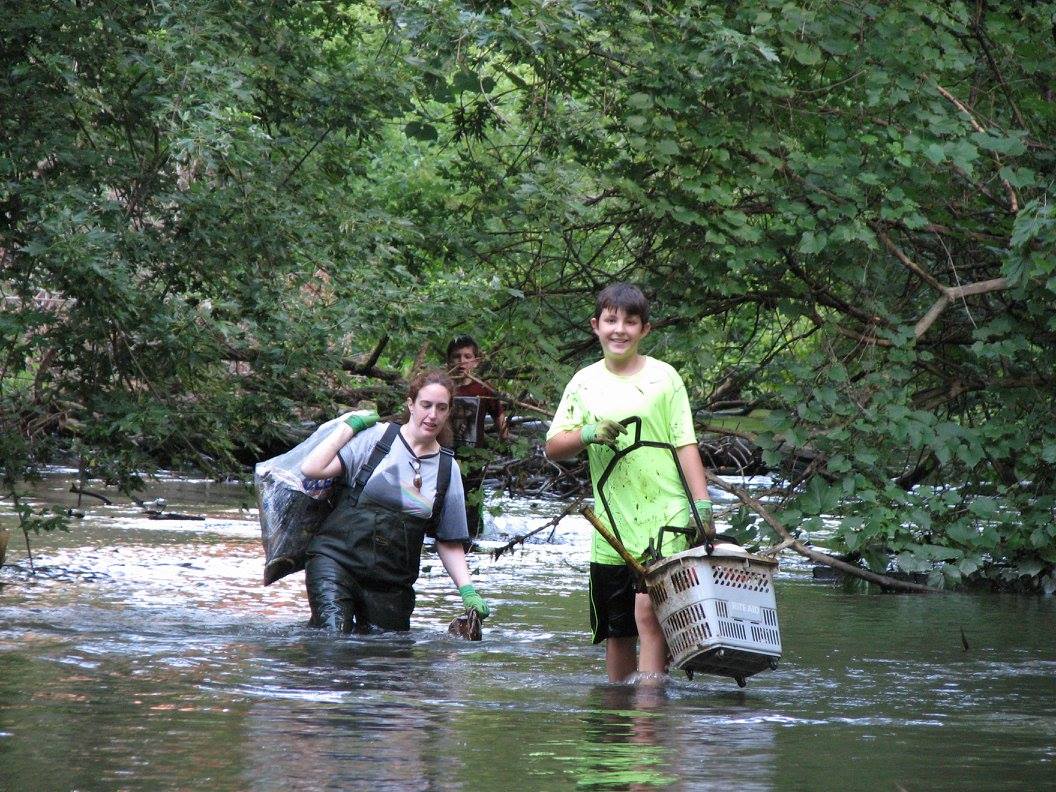Berkshire Environmental Action Team, also known as BEAT, is the Berkshire’s very own environmental activism, stewardship and education organization. Since 2003, BEAT has made it their mission to inform residents about environmental issues affecting western Massachusetts. BEAT also hosts a wide array of programming such as Green Drinks, wildlife tracking, and invasive kiwi pulls (more about that later!); while also partnering with local organizations such as the Housatonic Valley Association for Housatonic River cleanups and Pittsfield Recycles to bring recycling to downtown events. The Berkshire Environmental Action Team is involved in so much that it is impossible to cover it in one article, so we will focus this article primarily on BEAT’s impact in Pittsfield. Please take a few moments to learn about the work being done to protect your environment by a team of dedicated professionals and volunteers, and get involved if you can!
BEAT was founded in 2003 when a group of concerned citizens, staff and faculty at Berkshire Community College came together to oppose a proposed soccer field on the campus which would decimate a vernal pool complex on the property. These individuals started publishing “The BEAT News”, an e-newsletter featuring environmental issues and related events, and despite failing in their attempt to save the pools, they learned a lot and became a strong community.
Since then, BEAT has continued to grow, while still publishing the weekly “The BEAT News”. BEAT has become known for its environmental watchdogging, stewardship, education, and outreach. A major project of BEAT is the “Berkshire BioBlitz”, an annual 24-hour biological survey in one location in Berkshire County in partnership with Dr. Augie’s Science Education Programs. The BioBlitz is “an action-packed day designed as educational event, scientific endeavor, and part community service event. It brings together scientists and the public in a race against time to see how many species they can count in a 24-hour biological survey of a given area.” [1]
“We bring in specialists from all sorts of fields from bryophytes which are mosses and related plant species, to leaf miners which are little bugs that live in leaves, to mammals to birders”, says Elizabeth Orenstein, Education & Outreach Coordinator at BEAT.
“The idea is to catalog as many different species as we possibly can, and sometimes that can happen right there in the moment like with a butterfly or a plant, or sometimes it has to happen a couple of days later, like we have an algae expert who often needs to go back to her lab (with a specimen)”.
The first annual Berkshire BioBlitz was held in 2010 at the Pittsfield State Forest, and in 2012, Berkshire Bioblitz was held at Burbank Park at Onota Lake. The major finding of the BioBlitz at Burbank Park was the successful confirmation of invasive hardy kiwi. “Originally planted as an ornamental vine, (invasive hardy kiwi) is now exhibiting invasive qualities and having a deleterious impact on habitat, biodiversity, and resiliency”. [2] “Curtains of vines form ‘amphitheatres’ of kiwi that strangle native herbaceous plants, shrubs, and mature trees, creating acres of unsustainable, unhealthy monoculture”. [3] The kiwi vine can grow over 20 feet per year; and in response, BEAT, MassAudubon, and other groups across the region are banding together to stop this invasive vine before it becomes uncontrollable.
For the past 5 years, BEAT has worked with volunteers to remove invasive kiwi from Burbank Park by hand and without the use of herbicides, and they have found that the native species have just been “hanging out” and will come back once they make room for them.
“Free A Tree! Invasive Kiwi Pulls” are held weekly at Burbank Park. Spend about an hour and a half with other volunteers pulling and cutting invasive kiwi from the park. Gloves and tools are provided, but bringing extra tools such as loppers, pruning sheers, and pruning saws is encouraged.
Upcoming Kiwi Pulls are October 12th, 3:00 to 4:30 pm; October 21st, 9 am to 12 pm; October 26th, 3 to 4:30 pm; and November 2nd, 3 to 4:30 pm. Meet up at the Burbank Park Boat Launch before heading out to the woods.
BEAT also “addresses environmental threats in the Berkshires using evidence-based science and (their) years of experience with regulations and policies”. [4] BEAT, and the No Fracked Gas in Mass program, advocate against fossil fuels and advocate FOR sustainable energy and solar access. Through BEAT and the Center for EcoTechnology (CET), middle income property owners can qualify for a low interest loan to buy a heat pump and/or solar panels. The monthly payment on that loan is less than the owner’s current electric bill, giving them access to sustainable energy. Click here to learn more.
Other BEAT programs include storm water surveying and sampling and wildlife tracking. BEAT partners with the Housatonic Valley Association (HVA) to train volunteers, ensuring adherence to quality assurance standards. BEAT’s wildlife tracking club, Berkshire Wildlife Trackers, meets monthly and draws both professional and amateur trackers.
“Tracking is important not only because it’s fun and it gets you out in nature and it teaches you who’s hanging out in the woods”, says Orenstein, “but it is also a part of this regional initiative we are part of called ‘Staying Connected’, which is improving wildlife connectivity from the Hudson Highlands down in the south to the Green Mountains in Vermont.” The goal of ‘Staying Connected’ is to make it more possible for wildlife to pass under or over roads safety, because when we help our wild animals survive man-made dangers we have more vibrant ecosystems.
BEAT is also working with state partners and the City of Pittsfield on the “Pittsfield Greening the Gateway City Program”. Select neighborhoods in Pittsfield qualify for free trees planted by trained professionals.
The program is part of the Massachusetts Greening the Gateway Cities Program (GGCP), “an environmental and energy efficiency program designed to reduce household heating and cooling energy use by increasing tree canopy cover in urban residential areas in the state’s Gateway Cities”.
“BEAT is the lead organization in Pittsfield helping with outreach and helping to water the many young trees planted in the public housing areas of Pittsfield. These trees will not only help lower the energy use in our public housing areas but make them more attractive areas to live and play.” [5]
To see if you qualify for a free tree, view the map on BEAT’s website or call 617-626-1515.
BEAT also has several community partnerships from the Berkshire Natural Resources Council to the Berkshire Athenaeum. BEAT and the Housatonic Valley Association (HVA) co-sponsor about two Housatonic River clean-ups each summer, and after many successful clean-ups in the books, they are finding that the river clean-ups are increasing less dramatically needed. BEAT also partners with the Pittsfield Recycles Campaign, helping to deliver clear information about recycling to Pittsfield residents. At the July 2018 3rd Thursday event in downtown Pittsfield, Pittsfield Recycles gave out over 70 recycling bins to residents, many who said: “I never tried recycling but now that I have the bin, I’m going to try it”. Another successful initiative of Pittsfield Recycles was finally getting temporary recycling bins out along North Street for the September 2018 3rd Thursday. The Department of Public Works placed clearly marked blue recycling bins for the event held September 20th; and expect to see the bins in May when 3rd Thursdays return for 2019.
BEAT also hosts a number of free community events throughout the county. Pittsfield Guided Tree Walks help participants learn how to identify the trees growing all around us. Pittsfield Green Drinks, held the third Tuesday of the month at J. Allen’s Clubhouse Grille, 41 North Street, is a networking night for the environmentally conscious, with guest speaker(s) and a Q&A on a variety of topics such as energy efficiency, sustainable living, the wetlands protection act, and wild edibles.
Pittsfield Green Drinks will welcome Tonya DeFriest from “I’m Not Gonna Get Ticked” on October 16th at 6 pm. Tonya is an educator and activist teaching the community about tick-borne illnesses.
On November 20th, Pittsfield Green Drinks will welcome Jessica Toro from Native Habitat Restoration. Jessica will discuss invasive plants with a focus on vines and her remediation of the invasive kiwi at Kennedy Park in Lenox, MA.
On December 18th, Pittsfield Green Drinks will feature a demonstration of how to economically and efficiently make your own storm window inserts.
If you would like to learn more about the Berkshire Environmental Action Team or get involved, “the first thing you can do is subscribe to our newsletter because we believe an informed and engaged citizenry is the environment’s best defense”, says Orenstein. “We always have a ton of different ways you can get involved. You can volunteer and occasionally we have paid positions. And if you have any issue or initiative that you want some guidance on or just want to get involved with, just come and talk to us and we’ll be your resources.”
By Kimberly Gritman, Downtown Marketing Coordinator
Berkshire Environmental Action Team (BEAT) is a 501(c)3 non-profit whose mission is to work with you to protect the environment for wildlife in support of the natural systems that support us all.
[1] http://www.berkshirebioblitz.org/about/
[2] http://www.thebeatnews.org/BeatTeam/history-origins-hardy-kiwi/
[3] BEAT handout on “Invasive Hardy Kiwi”
[4] BEAT pamphlet
[5] http://www.thebeatnews.org/BeatTeam/pittsfields-greening-the-gateway-city-MAprogram/



